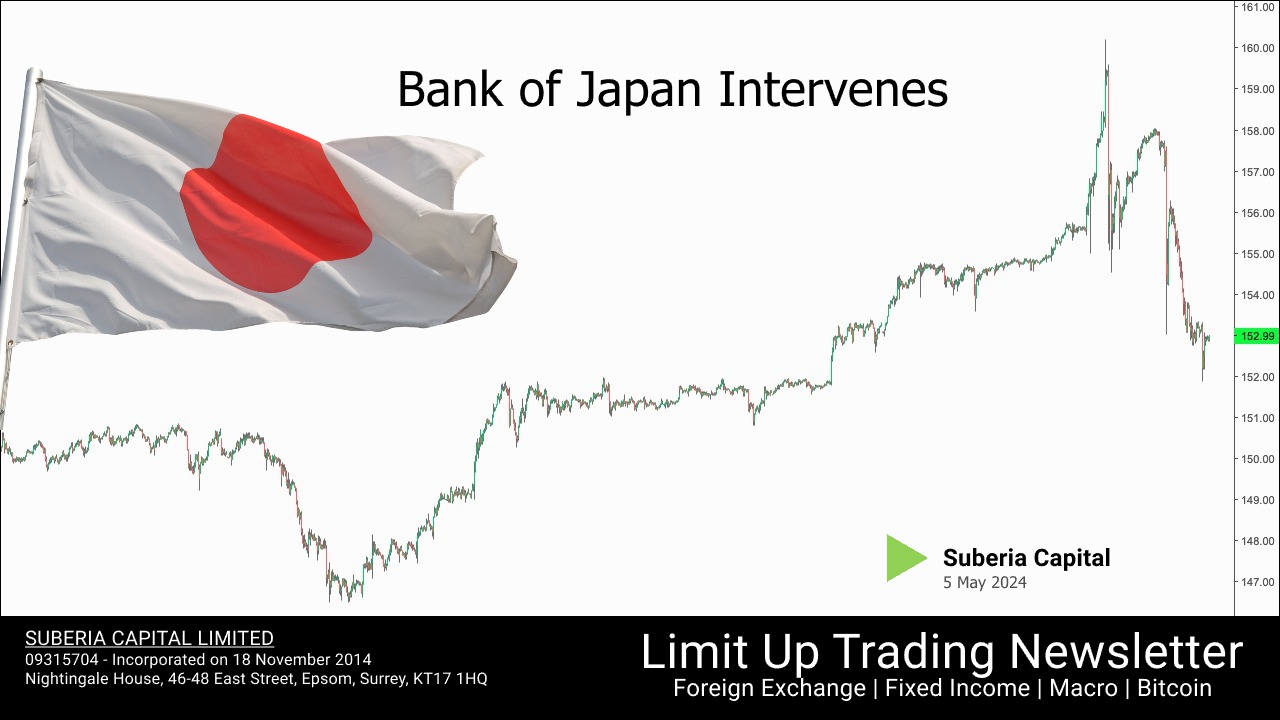Bank of Japan Intervenes

Breaking: US Nonfarm Payroll Shocks To The Downside
Breaking: US and Saudi Arabia Said to Be Near Historic Pact [Bloomberg]
Laughing: Trump ‘wants to set interest rates himself’ if he returns to power [The Times]
Important: Jamie Dimon: Bank boss warns US interest rates could rise to 8% [BBC]
Important: China’s US Treasury Holdings Becoming ‘Hostages,’ Academic Warns [Bloomberg]
Huge Volatility in Markets
We started the week with central bank intervention.
The Bank of Japan intervened twice, once when USD / YEN went above 160.00 and also as the market tried to rebound to 158.00. Friday's Nonfarm Payroll surprisingly came in significantly weaker than expected and help push USD / YEN back to 152.00 by the close of the week.
This a huge (5%) move in a currency pair that we used to say only moved 20% in a decade. Sure Bitcoin used to do 5% every day but that only impacted Bitcoin buyers. A 5% devaluation (or appreciation) of a currency affects everyone in that country.
Instant view: Japan's yen jumps against the dollar after earlier plunge [Reuters]
Zooming out, the BoJ is defending a rate that we haven't seen since 1990

USD / YEN Monthly
Let's recap why this is happening
- A massive multi-year carry trade where investors can borrow Yen at 0% and buy US Treasuries at 5% plus. And get the USD appreciation !
The media will blame hedge funds (again) and those nasty speculators but markets don't move like this unless fundamentals support it. Those fundamentals are
- Japan's debt to GDP at 250% is the worst in the world
- The Bank of Japan is the owner of most of the country's debt
- Only institutions required to buy Japanese Government Bonds would do so
- 10 year JGB yields have been below 1% for 12 years
- The Japanese Government can't let yields rise much as it will massively increases their debt burden
So the escape valve is the currency and this intervention is intended to slow the price appreciation. I'm hearing $50 billion USD was sold last week. We'll know for sure when Japan reports it's FX reserves next week

Japan Foreign Reserves (USD)
Beware a market that suspects that you have no ammunition left. That's not now but once it's gone it can't come back.
US Treasury Quarterly Refunding Announcement
The announcement of Wednesday is super importatd. You can read about it here.
There is lots of technical stuff but here's the summary
- Auction sizes as expected
- $US 125B for the quarter
- Coupon and bills split unchanged
Ok so at US 10 year at 4.70% an announcement in line with analysts expectation should calm markets but....
The US Treasury has also announced a buyback program, the first since 2002, set to begin on May 29, 2024, aiming to improve liquidity in the Treasury market and run through July 2024.
- The program will involve weekly liquidity support buybacks of up to $2 billion per operation, up to $500 million in TIPS.
- The Treasury does not expect to increase nominal coupon or floating-rate note auction sizes for the next several quarters.
- This initiative is part of a broader effort to manage the government's debt and maintain stability in the financial markets, complementing the Federal Reserve's ongoing efforts to manage interest rates and inflation.
When the 10 year went illiquid 8 months ago at a yield of 5%, primary dealers were reporting no buyers for off-the-run coupons as no-one want to hold the collateral (no buyers). I think that, in anticipation of illiquidity, these buy-backs may be to clean up the market structure. Which is a good thing.
US Treasury keeps auction sizes unchanged through July, launches buyback [Reuters]
FED Holds Rates & Gives Dovish Presser
Key points
- Tapering QT so not selling so many bonds from balance sheet
- Economy continues to expand
- Lack of further progress on inflation
- Inflation and employment goals into better balance over the past year
FED holds rates steady [CNBC]
Tuesdays Employment Cost Index must have been unsettling for a FED that is itching is cut rates before the election in November. But it can't.
![]()
US Employment Cost Index Q1 2024
Nonfarm Payroll Report Shocks To The Downside

US Nonfarm Payroll April 2024
Risk assets surged finally, having whipsawed all week, as a weaker dollar, dovish FED and weaker payrolls gave us a surprising end to the week.
In The Background
Europe
ECB's Stournaras sees just three rate cuts in 2024 on strong growth [Reuters]
Canada
Is the Loonie next in line

USD / CAD Monthly
Canadian consumers, businesses, and governments have been accumulating debt at an unsustainable pace for over a decade and it’s starting to come to a head.
Total debt in Canada (consumer, corporate, and government debt combined) has reached $10.2 trillion, that translates to a debt-to-GDP ratio of 357%. That's total not just Govt debt.
For comparison, that’s well above the US just before the Great Depression (125%), Japan just before their lost decade (239%), and Greece before their sovereign debt crisis (206%).
At 357% Canada is actually in the same camp as the US just before the Global Financial Crisis when they had a debt burden of 349%.
More Pain For The US. Civil Unrest and looming recession
- Protests at universities
- People living on street
- Gangs looting stores
- Civil liberties being removed
- Small Businesses in Crisis As Rising Numbers Unable To Pay Rent [Newsweek]
China
China stocks soar

Hang Seng Daily
China downsizes holdings of US treasury bonds to $775 billion: data [Global Times]
Central Bank Digital Currencies
Unification Of CBDCs? Global Banks Are Telling Us The End Of The Dollar System Is Near [zerohedge]
What's Next
2 central bank monetary policy meetings (Reserve Bank of Australia and the Old Lady of Threadneedle Street) will be the bulk of the media interest this week but there are 10 and 30 bond auctions in the US that need to be successful for the positive tone of this week to continue.
This Week's Important Economic Indicators [London time]
![This Week's Important Economic Indicators [London time]](https://vip.suberia.capital/hs-fs/hubfs/indicators-May-04-2024-02-19-03-8671-AM.jpg?width=660&height=474&name=indicators-May-04-2024-02-19-03-8671-AM.jpg)
 Ian Reynolds
Ian Reynolds


.jpg?width=352&name=Limit%20Up%20Newsletter%20Cover%20(29).jpg)
